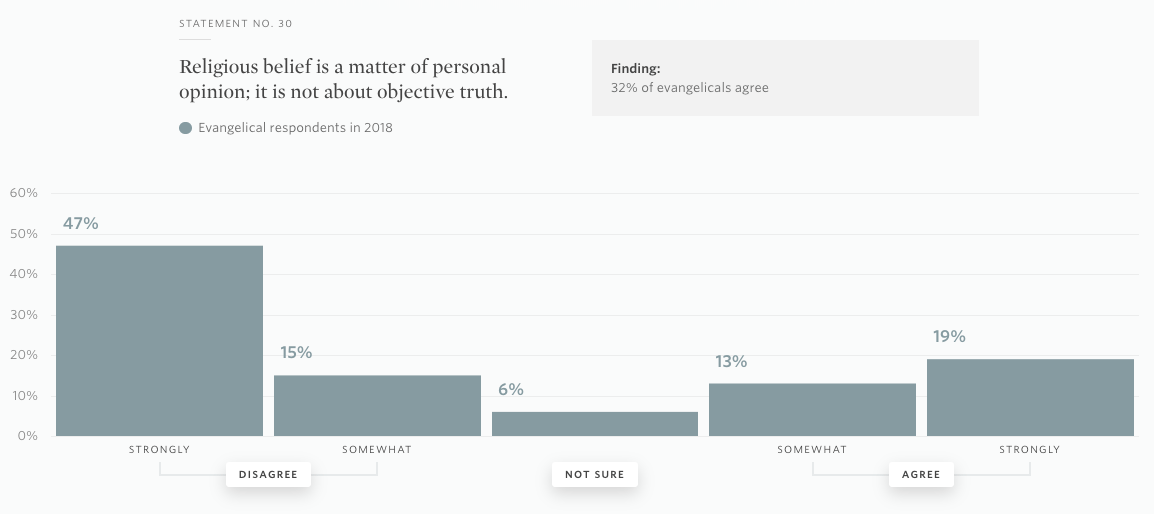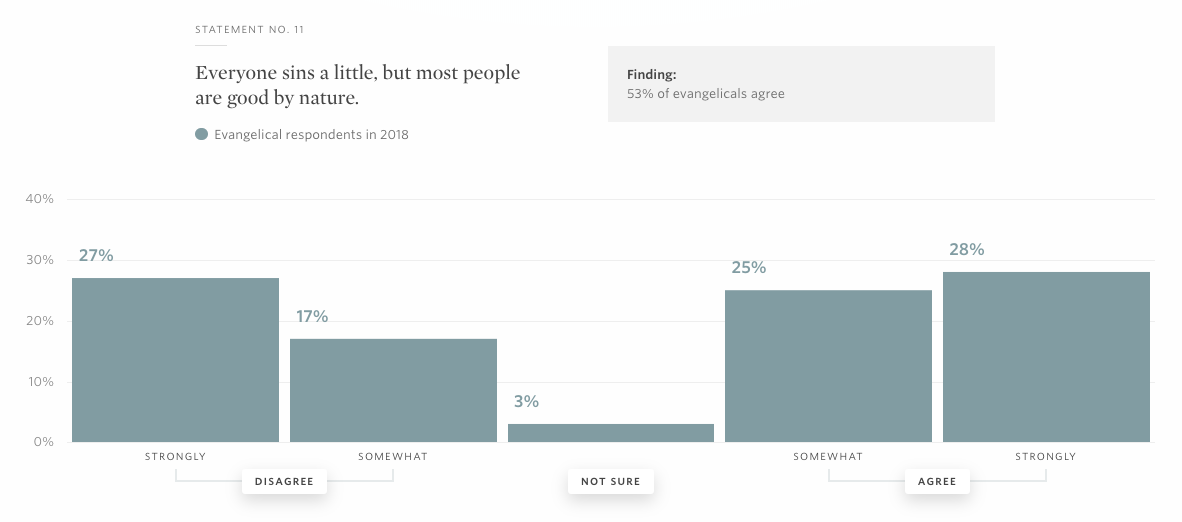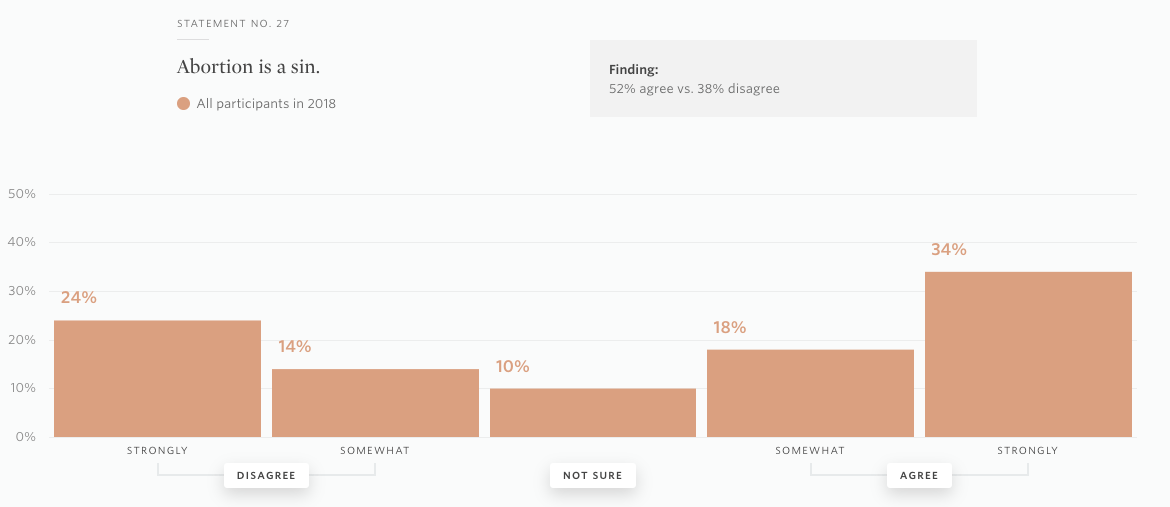In this series

American evangelicals are “deeply confused” about some core doctrines of the Christian faith—and the fourth-century heretic Arius would be pleased, according to a new survey.
For the third time, Ligonier Ministries has examined the State of Theology in the United States, conducted by LifeWay Research and based on interviews with 3,000 Americans. The survey, also conducted in 2014 and 2016, offers a detailed look at the favorite heresies of evangelicals and of Americans at large.
Ligonier wanted to know what Americans “believe about God, salvation, ethics, and the Bible.”
“Overall, US adults appear to have a superficial attachment to well-known Christian beliefs,” stated the ministry. “For example, a majority agreed that Jesus died on the cross for sin and that he rose from the dead.
“However, they rejected the Bible’s teaching on (1) the gravity of man’s sin, (2) the importance of the church’s gathering together for worship, and (3) the Holy Spirit,” stated Ligonier. For example:
- More than two-thirds (69%) of Americans disagree that the smallest sin deserves eternal damnation—and 58 percent strongly disagree. Ligonier finds this “alarming.”
- A majority of US adults (58%) said that worshiping alone or with one’s family is a valid replacement for regularly attending church. Only 30 percent disagree.
- A majority of US adults (59%) say that the Holy Spirit is a force, not a personal being.
Ligonier cites relativism for such a “casual outlook.” In the survey, 6 in 10 Americans agree that “religious belief is a matter of personal opinion [and] not about objective truth”—and 1 in 3 evangelicals (32%) say the same.

When it comes to Americans with “evangelical beliefs” [see below for LifeWay Research’s four-part definition], the survey found that a majority say:
- Most people are basically good (52%)
- God accepts the worship of all religions (51%)
- Jesus was the first and greatest being created by God the Father (78%)
“However, all these beliefs are contrary to the historic Christian faith,” stated Ligonier, citing Romans 3:10 on sin, John 14:6 on God, and John 1:1 on Jesus. For example, while an overwhelming 97 percent of evangelicals do believe that “there is one true God in three persons,” 3 out of 4 of them attempt to give Jesus first-place honors even though that belief “has been rejected by the church down through the centuries.”
Ligonier noted:
Strangely, while most evangelicals strongly believe in justification by faith alone, they are confused about the person of Jesus Christ. On one hand, virtually all evangelicals express support for Trinitarian doctrine. Yet at the same time, most agree that Jesus is the first and greatest being created by God, which was a view espoused by the ancient heretic Arius.
Arius was condemned at the Council of Nicaea in 325, and again at the Council of Constantinople in 381. Yet the number of American evangelicals who agree with his view has increased from 2016, when 71 percent agreed and 23 percent disagreed, to today when 78 percent agree and 18 percent disagree.
“These results show the pressing need for Christians to be taught Christology, especially as the outcome has gotten worse since 2016,” stated Ligonier. “There is a general lack of teaching today on the person of Christ, a doctrine for which the early church fought so hard.”

On social issues, the 2018 edition is the first of Ligonier’s three surveys to find that more Americans agree than disagree that “the Bible’s condemnation of homosexual behavior doesn’t apply today” (44% vs. 41%).
On abortion, it found that a “slim majority” of Americans believe that the procedure is a sin (52% vs. 38%), including 57 percent of those ages 18 to 34.
In fact, millennials were overall one of the survey’s bright spots.
“There has been a significant change for the better among millennials across a range of questions when compared to previous State of Theology surveys—so much so that they score higher than any other age group in several areas,” stated Ligonier. “Whether this is an anomaly or will continue unabated in future years remains to be seen.”
The number of Americans ages 18 to 34 with evangelical beliefs (as defined by LifeWay Research) “rose significantly” from 14 percent in 2016 to 18 percent in 2018. Ligonier also noted a “large increase” in millennials affirming that salvation is found in Christ alone (62%, up from 53% in 2016) and that Jesus Christ will return to judge the world (64%, up from 55% in 2016).
In contrast, more than half of millennials (53%) now agree that the Bible “contains helpful accounts of ancient myths but is not literally true,” continuing a trend up from 46 percent in 2016 and 44 percent in 2014.
More millennials are also now viewing God as “unconcerned with my day-to-day decisions”: 36 percent agreed in 2018, up from 30 percent in 2016 and 21 percent in 2014.
Ligonier’s survey found that millennials have grown a bit more conservative on abortion as a sin (57% agreed in 2018 vs. 50% in 2016) and on sex outside of marriage as a sin (54% agreed in 2018 vs. 47% in 2016). However, about half believe that the Bible’s condemnation of homosexual behavior is outdated (51%) and that gender identity is a choice (46%).

“The State of Theology survey highlights the urgent need for courageous ministry that faithfully teaches the historic Christian faith,” stated Chris Larson, president and CEO of Ligonier Ministries. “It’s never been popular to talk about mankind’s sinfulness or the exclusive claims of Jesus Christ. But at a time when a darkened world needs the light of the gospel, it’s disheartening to see many within the evangelical church confused about what the Bible teaches.”
“These results are a serious cause for concern,” said Stephen Nichols, Ligonier’s chief academic officer and president of Reformation Bible College. “… The evangelical world is in great danger of slipping into irrelevance when it casually forgets the Bible’s doctrine.”
Ligonier’s complete findings can be found at thestateoftheology.com.
Do you believe a false teaching? CT offered a six-question quiz, based on Ligonier’s 2014 survey, as part of a 2015 cover story on the truth about heresy and when to give (and not give) theological errors the ultimate warning label. CT also compiled history’s biggest heresies.
CT also rounded up expert views on whether your local church has the authority to declare that you are not a Christian (based on Ligonier’s 2014 survey). A 2016 podcast asked LifeWay Research’s Scott McConnell, who oversaw Ligonier’s research, if churches are full of heretics.
Since the last survey, Ligonier founder R. C. Sproul passed away. CT noted the famous theologian’s obituary and tributes as well as one of his last letters to the church. CT previously highlighted Sproul’s testimony in a 2002 interview.
Christian History has examined how Arianism almost won despite the first Council of Nicaea.
Methodology:
LifeWay Research interviewed a demographically balanced online panel of American adults and received 3,002 completed responses, including 581 adults with evangelical beliefs. The survey was carried out from April 24 to May 4, 2018.
Evangelicals were defined as people who strongly agreed with the following four statements:
- The Bible is the highest authority for what I believe.
- It is very important for me personally to encourage non-Christians to trust Jesus Christ as their Savior.
- Jesus Christ’s death on the cross is the only sacrifice that could remove the penalty of my sin.
- Only those who trust in Jesus Christ alone as their Savior receive God’s free gift of eternal salvation.



















